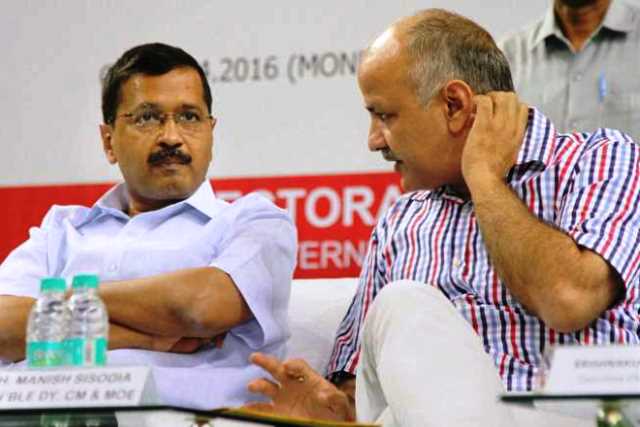
AAP ka Impression
For one born of an anti-graft movement that captured the nation’s imagination ten years ago, corruption charges are why the Aam Aadmi Party (AAP) is facing its worst moment. Manish Sisodia, its virtual Number 2, resigned as Delhi’s deputy chief minister when put behind bars. Critics ask whether he could have acted without a nod from his chief, Arvind Kejriwal.
The duo’s liquor marketing briefly made the National Capital a boozer’s paradise when it emboldened some private liquor vendors to introduce buy-one-get-one-free offers. The Delhi Government earned about ₹8,917 crore through bidding against a reserve price of ₹7,041 crore and ₹768 crore in the first month. But it was withdrawn within eight months amid allegations of corruption and favouritism in license granting.
Investigations are on and even the legality of Sisodia’s arrest is being questioned. Judicial scrutiny is on the cards that, under prolonged media glare, will see AAP’s further spanking. Until its outcome is known, one should not prejudge it.
But politics is different. Unsurprisingly, both the Congress and the Bharatiya Janata Party (BJP), disrupted by the newbie’s rise have screamed ‘excise scam’. The Congress blames AAP’s forerunner, the “India Against Corruption” movement for its downfall and its Delhi debacle. Ajay Maken calls it an “open and shut case”.
Swarajya editor R Jagannathan, known for his pro-BJP stance has, however, cautioned against it. He points, with justification, to the rot in the system, how and why it has landed into money swamping all political activity and hence, governance. No money, no vote, no prospects of power. This applies to all, just all, players – no exceptions.
Home to the nation’s capital, Delhi has been a unique Centre-dominated half-state. In ruling it, both the Congress and the BJP resented the Centre breathing down their necks. But in recent years, Delhi’s political discourse has taken a toxic “pehley-aap” mode, literally. Each Lt. Governor has behaved as the Centre’s ‘Laat Sahab’, perennially confronting the elected representatives. Taking the Centre-state tussle to the Supreme Court has not helped. The apex court has to intervene even to get Delhi’s civic bodies to function.
ALSO READ: Who Benefitted From Delhi Booze Policy Flipflop
Add to these – a key part of the problem – the role of the Centre-governed Delhi Police. Count the strictures it has earned from the state judiciary and higher courts, particularly in the investigations and trials of the February 2020 violence in North Delhi. Incidentally, AAP legislator Amanullah was acquitted by a court on the day Sisodia was arrested.
That, plus serious doubts over the Centre’s use of various investigative and enforcement agencies. But then, Delhi is not alone. Most opposition-ruled states have proactive, even combative central government representatives. They could knock on any door. One hears of ‘silence’ observed by some prominent opposition leaders, ostensibly on this score.
Politically, AAP has been a significant disrupter as shown by its two landslide wins in Delhi, also in its civic bodies, and in Punjab last year. It has sought to spread its wings to other states in its bid to become a national party, opening accounts in Goa and Gujarat.
Complexities abound in the BJP-AAP relationship. One reason for AAP’s success is that Kejriwal understands the Modi pulse well. He attracts the charge of being BJP’s B team when he tries to climb the Hindutva platform. But then, Congress, too, engages in projecting Rahul Gandhi as a ‘janeudhari’ Brahmin. With Congress, AAP’s relationship is simply hostile in the way it has undercut its support base. The Congress, too, has kept the AAP out of the opposition unity moves it has initiated.
Both Congress and AAP were wary of taking a clear stand on the farmers’ agitation and North Delhi’s violence targeting the Muslims. This underscores the fact that BJP determines the agenda for its opponents.
Besides running Delhi with its hands tied, Punjab, the sensitive border is witnessing the return of separatist forces. Not just political, this extends to national security and external threat perceptions. AAP cannot afford to err in its governance tasks.
The political challenge to AAP is heightened with assembly elections in some states where it seeks to expand, and the general elections just a year away. Kejriwal was in Karnataka for the election campaign while the crisis brewed in Delhi. Contesting and winning elections, after all, has become the core of the political game in the country. AAP cannot be different.
Its emergence is the story of the last decade – of the 2010s – that engulfed many countries where mass movements captured the public imagination. Many of them have sadly lapsed into seeing personality cults built on aggressive ‘nationalism’. This trend shows no sign of ebbing and feeds the current global political discourse.
Kejriwal has made a difference by enforcing a generational change and enrolling young professionals who had practically no role in the political discourse unless they chose politics as their full-time profession. AAP has so far retained the support of the young among the urban middle class in a country that is getting fast urbanized.
The rise of AAP or the rot in it – depending upon how one views it, whether as a middle-class movement or just another political party in pursuit of power – was inevitable, even if considered undesirable. I learnt of its internal churning and its developing differences, of all the places, in the toilet in a mall.
I spotted one of its leading lights, legal luminary Shanti Bhushan, coming to see a film. After a brief reminder of my having interviewed him, I popped the AAP question. He spoke about it long before the party took a formal shape, to the chagrin of many in the intelligentsia, seeking change without being in politics.
Mass movements need messiahs, and Anna Hazare, with due respect, is no Vinoba Bhave. Unwittingly, Hazare became part of a political churning that he either couldn’t help or didn’t mind. Little wonder, his occasional fulminations carry no weight and little media attention.
Nobody likes corruption, but few shun it when the push comes to serve and fewer understand its dynamics. A decade after the anti-graft movement and the clamour for an ombudsman who would expose it and punish the guilty, it cannot be said that corruption has been reduced in India, let alone eliminated. Only, its pursuit is selective, depending upon who wields power — political power, not moral. Given human nature, it is forever on the man’s to-do list, an ideal to be pursued.
AAP succeeded in Delhi and Punjab because it was perceived as a movement against traditional politics. It was a revolt against an establishment ruined by corruption, crime, conspiracy, and money and muscle power. It is a very difficult path. It walks it or joins the rest. We shall see.
The writer can be reached at mahendraved07@gmail.com
Read More:http://13.232.95.176/



